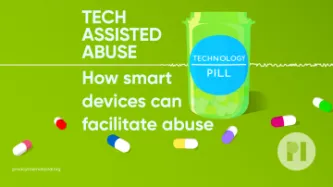Advanced Search
Content Type: Examples
Amazon has begun issuing partner delivery companies with AI-enabled cameras to monitor and track drivers' behaviour on the road. The cameras add another layer of monitoring to existing requirements to run the smartphone app Mentor; drivers complain that the app's bugs lead to unfair disciplinary action against them; the app may also follow them into their homes. Drivers swap tips on gaming the app on Reddit.https://www.cnbc.com/2021/02/12/amazon-mentor-app-tracks-and-disciplines-delivery-…
Content Type: Examples
Amazon delivery partner companies are ordering their drivers to turn off Amazon's Mentor monitoring app so they can take more risks in order to hit Amazon's delivery targets. Mentor, made by a company called eDriving, is a smartphone app Amazon uses to monitor drivers in Amazon-branded vans that tracks drivers' speed, braking, acceleration, and cornering; it also detect "phone distraction" and gives drivers a safe driving score. Amazon has pushed the liability for infractions onto the more than…
Content Type: Examples
Numerous video clips from Amazon's in-van driver-facing surveillance cameras are appearing on Reddit in violence of Amazon's stated privacy policies and raising questions about drivers' privacy. The videos are clearly not being posted by drivers themselves, but come from inside Amazon delivery partners, though who is posting them is unknown. The cameras capture all aspects of drivers road behaviour; the company claims they protect road safety. Drivers say they do not have access to the videos.…
Content Type: Examples
A 24-year-old man in Atlanta, Georgia is suing Amazon after being left with extensive brain and spinal cord injuries after an Amazon van crashed into his car. Amazon claims it isn't legally liable because the driver worked for the delivery company Harper Logistics LLC. However, the lawsuit seeks to prove that Amazon controls all aspects of deliveries from how many packages drivers are assigned to their continued employment and tracks drivers intensively, pressuring them to take risks in order…
Content Type: Examples
Employees monitored by monitoring tools such as Hubstaff, CleverControl, and FlexiSPY report that the software takes a screenshot every ten minutes and calculate an activity score based on how they type and move their mouse. Aware that employers are looking at these scores, employees pause the tracker while they perform tasks such as participating in Zoom meetings, watching videos, or taking notes, which then requires them to work more hours to make up the time. A TUC poll in 2022 found that 60…
Content Type: Examples
Four people in Kenya have filed a petition calling on the government to investigate conditions for contractors reviewing the content used to train large language models such as OpenAI's ChatGPT. They allege that these are exploitative and have left some former contractors traumatized. The petition relates to a contract between OpenAI and data annotation services company Sama. Content moderation is necessary because LLM algorithms must be trained to recognise prompts that would generate harmful…
Content Type: Press release
Today the European Court of Human Rights held the United Kingdom accountable for its digital spying, even when that spying affects people outside of the UK’s borders.In this case, Mr Wieder and Mr Guarnieri, both researchers who work on information security and privacy, challenged the lack of access to redress mechanisms for alleged breaches to their rights to privacy and freedom of expression by UK intelligence agencies before the European Court of Human Rights.Mr Wieder and Mr Guarnieri…
Content Type: Examples
The European Court of Human Rights has ruled that the use of facial recognition technology to arrest protester Nikolay Glukhin on the Moscow metro system was "incompatible with the ideals and values of a democratic society governed by the rule of law". Glukhin's protest consisted of travelling carrying a life-sized cardboard figure of the dissident Konstantin Kotov holding a banner that said "I’m facing up to five years … for peaceful protests." Glukhin was arrested several days later, charged…
Content Type: Examples
Authorities in Germany and France are using legal powers intended for use against organised crime and extremist groups to crack down on direct action protests intended to spur public action against climate change. State authorities in Germany are preventively detaining protesters, in one case holding an individual for 30 days without charge. In France, lawmakers passed new surveillance and detection laws, and in UK legislation has made it illegal to lock or glue yourself to physical…
Content Type: Examples
A coalition of 65 NGOs including Access Now, EFF, and Article 19, have written a letter asking the European Commission to reject the possibility that content moderation provisions in the Digital Services Act could be used to compel social media shutdowns. The letter was in response to comments by Internal Market Commissioner Thierry Breton saying that the DSA would allow the Commission to fine and ban social media networks from operating in the EU that don't immediately remove hateful content…
Content Type: Examples
Despite mass demonstrations in 2022 supporting women's right to bare their heads, Iranian authorities are considering a draft law that proposes prison terms of five to ten years (up from ten days to two months) for women to refuse to wear the hijab, substantial fines for businesses and celebrities who disobey the rules, and the use of AI to identify women violating the code. The Iranian parliament would vote on the bill in the next two months. Security forces are already using some of the…
Content Type: Examples
Thousands of cameras made by Bosch are part of a surveillance network on the streets of Tehran that clerical rulers are using to track women who refuse to cover their heads in public. Amnesty International reports that women whose bare heads are detected receive text messages threatening them with fines. Bosch says its cameras, which were sold to Iran between 2015 to 2017, were not equipped with facial recognition technology, but that the Iranian state could use software sourced from elsewhere…
Content Type: Examples
Munich's public prosecutor has confirmed that since October 2022 the Bavarian authorities have been tapping communications of the Last Generation climate activist group, including phones, emails, and voicemails on suspicion that the group is forming or supporting a criminal organisation. Last Generation's public protests often include blocking traffic or throwing liquids or paint on artworks, buildings, and private plans and boats. In some cases, authorities also monitored mobile location…
Content Type: Examples
The Biden administration has recommended the renewal of Section 702 of the Foreign Intelligence Surveillance Act, warning that not doing so could constitute "one of the worst intelligence failures of our time". S702 allows the US government to collect the digital communications of foreigners living outside the US and if not renewed will expire at the end of 2023. A cross-party selection of lawmakers is calling for the law to be substantially reforms to ensure it's not used against Americans.…
Content Type: Examples
The ACLU, NAACP, and other civil rights and civil liberties organisations have called on the US Department of Homeland Security to investigate intelligence gathering at "Cop City", a plan to build a police and fire department training centre in a forest near Atlanta, Georgia. More than 40 environmental protesters defending the forest have been arrested and charged with domestic terrorism, and one was shot by police during a raid on the forest in January 2023. The organisations have warned in a…
Content Type: Examples
The UK's Northamptonshire Police used live facial recognition technology for the first time at the 2023 Formula 1 British Grand Prix in order to spot people who pose a "risk of danger to the wider public" such as wanted criminals, or people involved in serious crime or "unlawful protest". Northamptonshire Police said it would also send plain-clothed detectives and armed officers to patrol the circuit and use other measures to prevent disruption to the race.
https://www.bbc.co.uk/news/uk…
Content Type: Examples
In response to a damning report from Jonathan Hall KC, the reviewer of the UK's terrorism legislation, the Metropolitan Police referred to the Independent Office of Police Conduct the case of radical French publisher Ernest Moret. When Moret arrived at St Pancras station in London for a book fair in April 2023, police detained him for 24 hours under Section 7 of the Terrorism Act, confiscated his phone and laptop, and demanded he reveal his devices' passcodes. Hall said Schedule 7 powers…
Content Type: Advocacy
Em Junho de 2023, fizemos uma submissão para a 138ª Sessão do Comitê de Direitos Humanos, que ocorreu entre 26 de Junho de 2023 e 28 de Julho de 2023, em relação à conformidade do Brasil com o Pacto Internacional sobre Direitos Civis e Políticos (ICCPR) antes da adoção da Lista de Questões Prévias ao Relatório (LoIPR).Entre outras coisas, recomendamos que o Comitê de Direitos Humanos da ONU solicite ao governo Brasileiro que:Adira aos seus padrões internacionais e nacionais de direitos humanos…
Content Type: Advocacy
In June 2023, we made a submission for the 138th Session of the Human Rights Committee that took place between 26 June 2023 and 28 July 2023 in relation to Brazil’s compliance with the International Covenant on Civil and Political Rights (ICCPR) before the adoption of the List of issues prior to reporting (LoIPR).Amongst others, we recommended the UN Human Rights Committee call on Brazil to:Adhere to its international and national human rights standards to uphold the right to privacy and the…
Content Type: Video
Links
- Refuge's Tech Safety resources
- Refuge's Tech Safety smart home devices tool
- Read more about Dr Tanczer and her work
- Find out more about the Gender and Tech at UCL and sign up to the newsletter
- PI's guides to improve your own device security
- UK Member's of Parliament discuss smart tech and abuse
- Connected technology: MPs call on Government to tackle growing problem of tech-enabled domestic abuse
Content Type: Advocacy
Our submission focussed on the evolving impacts of (i) automated decision-making, (ii) the digitisation of social protection programmes, (iii) sensitive data-processing and (iv) assistive technologies in the experiences and rights of people with disabilities.We called on the OHCHR to:Examine the impact that growing digitisation and the use of new and emerging technologies across sectors has upon the rights of persons with disabilities;Urge states to ensure that the deployment of digital…
Content Type: Examples
Facial recognition technology using chips from the US companies Nvidia and Intel and deployed in the Moscow underground has helped police detain and question thousands of people on the way to and returning from protests against the Russia-Ukraine war. Nvidia and Intel are not thought to have breached sanctions. However, the Russian and Belarusian companies that provide the algorithms to perform face matching participated, and in some cases won prizes, in US facial recognition test programmes…
Content Type: Examples
Internal emails obtained under an FOI request show that between April and June 2022 the US Marshals Service received regular alerts from Dataminr, a company that monitors social media on behalf of corporate and government clients and an official partner of Twitter, advising them of the times and locations of ongoing and planned abortion rights protests. There is no oversight for this type of warning system, even though it can chill free speech. The pattern of alerts suggests that Dataminr is…
Content Type: Long Read
In June 2023, the UK government announced its proposal to expand its surveillance powers by, among others, forcing communications operators to undermine encryption or abstain from providing security software updates globally. Building on our response to the government’s plans, this piece explains why what they want to do puts every one of us at risk.
Why your trust (to technologies you use) matters
Surveillance and privacy are complex concepts to grasp – it’s part of the appeal to us at PI.…
Content Type: Examples
A heavily redacted report from the Foreign Intelligence Surveillance Court shows that the FBI turned a tool intended for foreign surveillance under a law known as Section 702 on 278,000 US citizens between 2020 and 2021, including suspects in the January 6 insurrection and Black Lives Matter protesters. The FBI brought in corrective measures in 2021 that caused the use of the database to drop dramatically. The Biden administration is seeking to renew Section 702 before it lapses at the end of…
Content Type: Examples
Thousands of dissidents in 40 countries were imprisoned for posting or reposting social, political, or religious content on social media between June 2021 and May 2022, according to the Freedom on the Net 2022 report. The report calls China, the most repressive of the 40, "the world's worst environment for internet freedom"; the country has detained journalists, human rights activists, members of religious and ethnic minority groups, and ordinary users. It is highlighted that protesters…
Content Type: Examples
A former executive at Bytedance, the owner of TikTok, has said in a filing relating to a wrongful dismissal lawsuit that the members of Chinese Communist Party maintained a backdoor channel to access TikTok user data belonging to Hong Kong protesters and civil rights activists in order to try to identify the individuals and their locations. The data included the users' network information, SIM card identifications, and IP addresses. Bytedance pulled the app out of Hong Kong in 2020 when a new…





